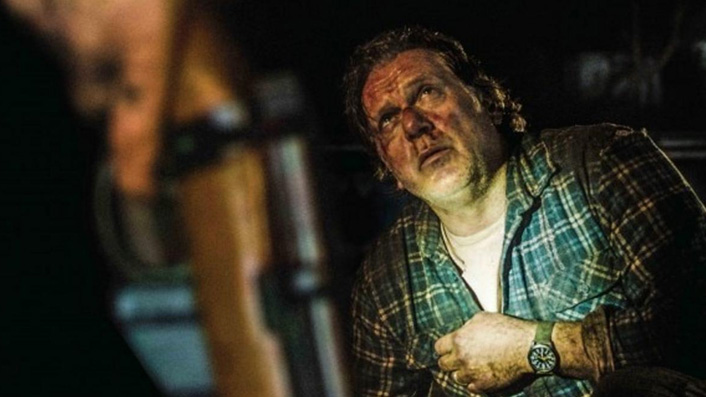Tense, shocking NZ thriller Coming Home in the Dark doesn’t let its audience off easy
“Violent outbursts punctuate the film in often unexpected, shocking moments…”

A family trip through the New Zealand wilderness turns into a nightmare when they’re suddenly confronted by a pair of drifters in this Sundance thriller. As Amanda Jane Robinson writes, this confident feature debut wrestles with this country’s ugly history in a clever manner.
A confident feature debut from James Ashcroft (Ngāti Kahu, Ngāpuhi), Coming Home in the Dark reveals the distinctly colonial terror lurking at the periphery of New Zealand’s tourism-tinted self-image.
When high school teacher Alan ‘Hoaggie’ Hoaganraad (Erik Thomson), his wife Jill (Miriama McDowell), and stepsons Maika and Jordon (real-life brothers Billy and Frankie Paratene) set out on a family holiday, their worries extend as far as sibling bickering and speeding tickets. During a scenic picnic, they are approached by curious strangers Mandrake (The Vampire Diaries’ Daniel Gillies, in a chilling turn) and Tubs (a striking, haunted Matthias Luafutu), who pull out a shotgun and rapidly turn the family idyll into a horror road trip.
See also:
* Movies now playing in cinemas
* All new streaming movies & series
The two kidnappers are the standout performances of the film, each firm in their grotesquery, scarred by a shared agony. More than just a tale of two cruel interlopers, though, the film wrestles with this country’s ugly history in a clever manner, never becoming didactic. Violent outbursts punctuate the film in often unexpected, shocking moments, yet it is the slowly dawning realisation of the rationale behind that violence that keeps the tension tight, even if the pacing occasionally slacks.
When combined with John Gibson’s foreboding soundtrack and the brutal, metallic gunshots that puncture the landscape, director of photography Matt Henley’s visuals and Annie Collins’ dexterous editing cement the film’s menacing tone. Those same rolling hills and coastal roads from all the picturesque postcards turn sinister come nightfall. What’s more distressing than headlights on a rural highway in the middle of the dark? Ashcroft’s assured directorial hand is keenly felt in these alluring images of pure dread: a roadside petrol station with a lone attendant; an empty car idling, keys in the ignition; cold breath in the night air. The New Zealand gothic here is alive and well.
Shot in just twenty days and nights in the bitter Wellington winter, the film premiered in Sundance Film Festival’s ‘Midnight’ programme in January and went on to screen at dozens of international festivals around the world. Across industry media it has been compared to the Coen Brothers’ No Country for Old Men and Michael Haneke’s Funny Games, both films that similarly linger in the grey area between good and evil and — particularly in Haneke’s case — challenge audience complicity.
Based on the short story of the same name by Owen Marshall, Coming Home in the Dark is not a tale of hope, but of the overwhelming weight of history, atonement’s long memory. Where the violence in the original text is chaotic and nihilistic, without firm motivation, this adaptation — co-authored by Ashcroft and his long-time writing partner Eli Kent — instead links the violence to this nation’s historic trauma. It’s in the atmosphere.
Never veering fully into cathartic revenge rampage, the film doesn’t let its audience off easy. By the film’s end, we remain uncertain and unsettled, sobered by this nation’s past, rotting at the root.






















